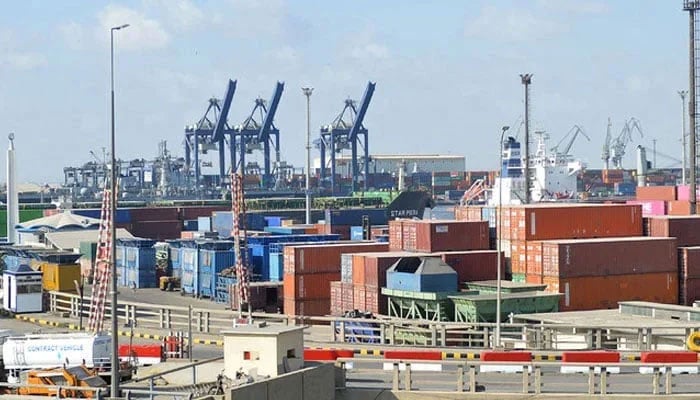Billions lost at sea: over-reliance on foreign shipping drains economy
Dependence on foreign vessels significantly strained Pakistan’s forex reserves, exacerbating economic challenges
ISLAMABAD: Pakistan spends an estimated $6-8 billion annually on freight charges due to its reliance on foreign shipping companies.
The Pakistan National Shipping Corporation (PNSC), the country’s sole national shipping company, operates 12 ageing vessels and does not own a single cargo container ship. This dependence on foreign vessels has significantly strained Pakistan’s foreign exchange reserves, exacerbating its economic challenges.
According to Defence Ministry sources citing the findings of the Task Force on the Revamping of the Maritime Sector, PNSC had launched an ambitious initiative to construct Pakistan’s first 1,120 Twenty-Foot Equivalent Unit (TEU) container ship at Karachi Shipyard. The project, estimated to cost Rs24 billion—substantially lower than the Rs32 billion price tag for a similar foreign-built ship—was abruptly halted a year ago. The delay not only deprived Pakistan of a crucial opportunity for domestic capacity-building and job creation but also resulted in significant revenue losses and potential cost escalations. However, the project has now been revived, offering a glimmer of hope for the country’s maritime sector.
The sources said that had the PNSC initiative been implemented earlier, it could have marked a historic shift toward local shipbuilding, reducing Pakistan’s reliance on foreign shipping firms and saving billions in freight charges. A major portion of the project’s payment was to be made in Pakistani rupees, which would have alleviated pressure on foreign exchange reserves. The delay has not only led to lost revenue but also heightened the risk of cost overruns, further straining the country’s finances.
The sources also highlighted the decline of Pakistan’s ship-breaking industry, which was once a global leader. The Gadani ship-breaking yard, which ranked as the world’s third-largest in the 1980s, now generates a mere Rs0.3 billion annually. Outdated infrastructure, poor connectivity, and failure to comply with international regulations—such as the Hong Kong Convention (HKC)—have rendered Gadani uncompetitive. In contrast, India and Bangladesh have advanced significantly, with 90 and six HKC-compliant yards, respectively.
Experts warn that if Pakistan fails to modernise its ship-breaking facilities, it risks losing even the minimal business it currently handles once the HKC comes into effect in July 2025. Pakistan’s strategic location at the gateway to major shipping routes presents a significant opportunity to transform its maritime sector. Authorities are focusing on several key initiatives, including developing a National Container Fleet by supporting PNSC’s pilot initiative and expanding local shipbuilding facilities to reduce dependence on foreign vessels, modernising Gadani through foreign investment, regulatory reforms, and infrastructure upgrades to meet international standards, building international-standard shipyards at Port Qasim and Gwadar through joint ventures with leading global shipbuilders and classifying inter-port cargo movement as ‘Coastal Trade’ to boost local shipping activity and reduce inland transport costs. The maritime sector holds immense potential for Pakistan’s economy. Shipbuilding is a labour-intensive industry that could generate thousands of jobs, while a national fleet could save billions in freight charges and curb the outflow of foreign exchange. Revamping Gadani and establishing new shipyards could position Pakistan as a regional maritime hub, attracting foreign investment and generating substantial revenue, the sources added.
-
 Space-based Solar Power Could Push The World Beyond Net Zero: Here’s How
Space-based Solar Power Could Push The World Beyond Net Zero: Here’s How -
 Kate Walsh Remembers Her 'Grey’s Anatomy' Co-star Eric Dane Following His Death At 53
Kate Walsh Remembers Her 'Grey’s Anatomy' Co-star Eric Dane Following His Death At 53 -
 AI Ad Wars Begin As Perplexity Snubs ChatGPT Advertising
AI Ad Wars Begin As Perplexity Snubs ChatGPT Advertising -
 Microsoft Copilot Bug Exposes Confidential Emails To AI
Microsoft Copilot Bug Exposes Confidential Emails To AI -
 Eric Dane Final Emotional Words Revealed After Tragic Death
Eric Dane Final Emotional Words Revealed After Tragic Death -
 Prince William 'furious' Regarding His Own Future After Andrew Arrest
Prince William 'furious' Regarding His Own Future After Andrew Arrest -
 Charli XCX Reveals ‘confusing’ Toll ‘Brat’ Popularity Took On Her
Charli XCX Reveals ‘confusing’ Toll ‘Brat’ Popularity Took On Her -
 Android Phones At Risk: PromptSpy Malware Exploits AI
Android Phones At Risk: PromptSpy Malware Exploits AI -
 Barry Manilow Gives Insight Into 'very Depressing' Doctor Visit As He Postpones 2026 Arena Tour Due To Cancer
Barry Manilow Gives Insight Into 'very Depressing' Doctor Visit As He Postpones 2026 Arena Tour Due To Cancer -
 Margot Robbie Opens Up About Imposter Syndrome ‘crisis’
Margot Robbie Opens Up About Imposter Syndrome ‘crisis’ -
 'Desperate' Sarah Ferguson Won't Go Down Without A Fight
'Desperate' Sarah Ferguson Won't Go Down Without A Fight -
 Prince William, Kate Face Major Challenge To Repair Monarchy Reputation After Andrew Arrest
Prince William, Kate Face Major Challenge To Repair Monarchy Reputation After Andrew Arrest -
 Hidden ‘dark Galaxy' Traced By Ancient Star Clusters Could Rewrite The Cosmic Galaxy Count
Hidden ‘dark Galaxy' Traced By Ancient Star Clusters Could Rewrite The Cosmic Galaxy Count -
 Eric Dane 'really Wanted To Talk About His Daughters' In His Final Netflix Interview Before Death
Eric Dane 'really Wanted To Talk About His Daughters' In His Final Netflix Interview Before Death -
 AI Superintelligence Race: Meta And Microsoft Back Rival Visions—Who Will Win?
AI Superintelligence Race: Meta And Microsoft Back Rival Visions—Who Will Win? -
 Chatbots Push Users Into ‘delusional Spirals,’ Experts Warn
Chatbots Push Users Into ‘delusional Spirals,’ Experts Warn




